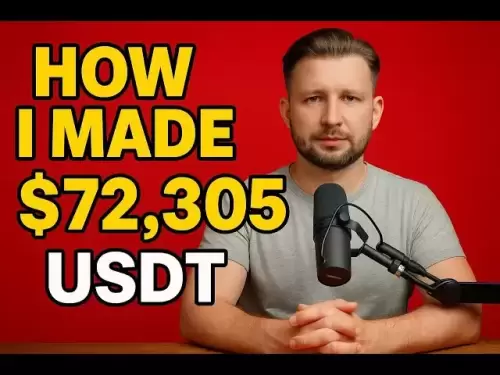 |
|
 |
|
 |
|
 |
|
 |
|
 |
|
 |
|
 |
|
 |
|
 |
|
 |
|
 |
|
 |
|
 |
|
 |
|
Cryptocurrency News Articles
A crypto startup once hailed as a rising star now faces turmoil
May 16, 2025 at 09:30 pm
After leaked documents exposed secret token promises to insiders, Movement Labs, backed by Donald Trump's World Liberty Financial, allegedly signed shadow agreements

A crypto startup once touted as a rising star is now facing turmoil after leaked documents exposed secret token promises to insiders, deepening scrutiny of a scandal-plagued firm.
A crypto startup once touted as a rising star is now facing turmoil after leaked documents exposed secret token promises to insiders, deepening scrutiny of a scandal-plagued firm.
Movement Labs, backed by Donald Trump’s World Liberty Financial, signed shadow agreements granting select advisers access to up to 10% of its MOVE token supply—deals never disclosed to investors, according to internal memos accessed by DeCrypt. These memos, detailing a series of agreements reached in late 2023, highlight how Movement quietly pledged millions in tokens to early supporters.
Movement Labs, backed by Donald Trump’s World Liberty Financial, signed shadow agreements granting select advisers access to up to 10% of its MOVE token supply—deals never disclosed to investors, according to internal memos accessed by DeCrypt. These memos, detailing a series of agreements reached in late 2023, highlight how Movement quietly pledged millions in tokens to early supporters.
Two agreements show adviser Sam Thapaliya, described by employees as a 'shadow co-founder,' would gain access to 7.5% of MOVE’s total supply—potentially worth over $50 million at launch—in exchange for strategic input. Another deal promised consultant Vinit Parekh nearly $2 million annually, also in exchange for advice. Both arrangements were labelled ‘non-binding’ by Movement, yet clauses required mutual consent to terminate.
Two agreements show adviser Sam Thapaliya, described by employees as a 'shadow co-founder,' would gain access to 7.5% of MOVE’s total supply—potentially worth over $50 million at launch—in exchange for strategic input. Another deal promised consultant Vinit Parekh nearly $2 million annually, also in exchange for advice. Both arrangements were labelled ‘non-binding’ by Movement, yet clauses required mutual consent to terminate.
Thapaliya maintains these deals, never announced publicly, remain valid and he plans legal action to claim his due share of tokens. “I fulfilled my obligations,” said Thapaliya, highlighting his role in selecting market-makers and advising on token strategy.
Thapaliya maintains these deals, never announced publicly, remain valid and he plans legal action to claim his due share of tokens. “I fulfilled my obligations,” said Thapaliya, highlighting his role in selecting market-makers and advising on token strategy.
However, Movement has insisted these agreements were exploratory in nature, and the signatures and termination disputes suggest the startup is now embroiled in a legal battle to avoid fulfilling the commitments.
However, Movement has insisted these agreements were exploratory in nature, and the signatures and termination disputes suggest the startup is now embroiled in a legal battle to avoid fulfilling the commitments.
Founders at Odds
The fallout has also ignited a public feud between Movement co-founders Rushi Manche and Cooper Scanlon. Manche, who was ousted as COO in May, has shifted blame for the controversial deals onto Scanlon, claiming his early decisions shaped the launch.
The fallout has also ignited a public feud between Movement co-founders Rushi Manche and Cooper Scanlon. Manche, who was ousted as COO in May, has shifted blame for the controversial deals onto Scanlon, claiming his early decisions shaped the launch.
"We can see that Cooper approved the terms of the agreement with Web3Port, despite legal counsel's warnings," Manche said in a statement, referring to a partnership that unfolded disastrously.
Scanlon, who has since stepped down as CEO but remains with the company, has kept silent amid the accusations. Tensions escalated after a leaked Thapaliya agreement surfaced online, prompting Manche to highlight Scanlon’s signature.
Scanlon, who has since stepped down as CEO but remains with the company, has kept silent amid the accusations. Tensions escalated after a leaked Thapaliya agreement surfaced online, prompting Manche to highlight Scanlon’s signature.
Employees describe Thapaliya as a key strategist, frequently consulted on major decisions including the partnership with Chinese market maker Web3Port. That deal, which unfolded disastrously and led to Binance's intervention, was tied to a $38 million token dump and a 50% price crash, ultimately sparking furious reactions from investors.
Employees describe Thapaliya as a key strategist, frequently consulted on major decisions including the partnership with Chinese market maker Web3Port. That deal, which unfolded disastrously and led to Binance's intervention, was tied to a $38 million token dump and a 50% price crash, ultimately sparking furious reactions from investors.
Movement's partnership with Web3Port lies at the heart of its unravelling. Documents seen by DeCrypt show the startup loaned 5% of MOVE’s supply to Web3Port, an allocation mirroring Thapaliya's in the leaked agreement. In return, Web3Port would provide liquidity and market-making services for MOVE.
Movement's partnership with Web3Port lies at the heart of its unravelling. Documents seen by DeCrypt show the startup loaned 5% of MOVE’s supply to Web3Port, an allocation mirroring Thapaliya's in the leaked agreement. In return, Web3Port would provide liquidity and market-making services for MOVE.
However, Web3Port massively overbid on the token during launch on May 10, quickly exhausting the assigned portion of funds. After the partnership soured, the market maker flooded exchanges with sell orders, triggering panic among investors and leading to several having their accounts banned.
However, Web3Port massively overbid on the token during launch on May 10, quickly exhausting the assigned portion of funds. After the partnership soured, the market maker flooded exchanges with sell orders, triggering panic among investors and leading to several having their accounts banned.
Analysts at the time called the terms of the deal "predatory" and accused Web3Port of pump-and-dump tactics, adding that Movement appeared to ignore several red flags. Legal counsel YK Pek was reportedly among those warning that the Web3Port partnership was "possibly the worst agreement" ever seen, yet revised terms were later approved by Scanlon, raising concerns of self-dealing.
Analysts at the time called the terms of the deal "predatory" and accused Web3Port of pump-and-dump tactics, adding that Movement appeared to ignore several red flags. Legal counsel YK Pek was reportedly among those warning that the Web3Port partnership was "possibly the worst agreement" ever seen, yet revised terms were later approved by Scanlon, raising concerns of self-dealing.
Investigators later found that Web3Port shared directors with Movement's foundation, further complicating issues of accountability.
Investigators later found that Web3Port shared directors with Movement's foundation, further complicating issues of accountability.
Investor trust in Movement evaporated rapidly as the startup's token price plunged and Coinbase halted trading on May 15, citing "routine review." By that point, MOVE had already crashed to $0.18, a staggering 80% drop from its peak.
Investor trust in Movement evaporated rapidly as the startup's token price plunged and Coinbase halted trading on May 15, citing "routine review." By that point, MOVE had already crashed to $0.18, a staggering 80% drop from its peak.
Binance also froze $38 million in funds linked to Web3Port's massive sell-off, while daily active addresses on the token fell to just 1,200.
Binance also froze $38 million in funds linked to Web3Port's massive sell-off, while daily active addresses on the token fell to just 1,200.
In response, Movement has since rebranded as Move Industries and pledged transparency, launching a $38 million buyback program to stabilise liquidity and announcing audits by firm Groom Lake to address governance gaps. However, skeptics question whether these steps will be enough to salvage the startup's battered reputation.
In response, Movement has since rebranded as Move Industries and pledged transparency, launching a $38 million buyback program to stabilise liquidity and announcing audits by firm Groom Lake to address governance gaps. However, skeptics question whether these steps will be enough to salvage the startup's battered reputation.
The scandal also highlights broader systemic issues in crypto's opaque token ecosystems. Informal deals, like Movement's undisclosed MOUs with Thapaliya and Parekh, allow startups to funnel wealth to insiders without sufficient oversight from investors or regulatory bodies.
The scandal also highlights broader systemic issues in crypto's opaque token ecosystems. Informal deals, like Movement's undisclosed MOUs with Thapaliya and Parekh, allow startups to funnel wealth to insiders without sufficient oversight from investors or regulatory bodies.
Several other cases, such as Eclipse's scrapped deal with Polychain, have come to light, showing how large-scale token projects often promise huge, undisclosed allocations of their tokens to VIPs and early backers, ultimately shaping market dynamics in ways that are never disclosed to the broader community.
Several other cases, such as Eclipse's scrapped deal with Polychain, have come to light, showing how large-scale token projects often promise huge, undisclosed allocations of their tokens to VIPs and early backers, ultimately shaping market dynamics in ways that are never disclosed to the broader community.
With authorities now circling major
Disclaimer:info@kdj.com
The information provided is not trading advice. kdj.com does not assume any responsibility for any investments made based on the information provided in this article. Cryptocurrencies are highly volatile and it is highly recommended that you invest with caution after thorough research!
If you believe that the content used on this website infringes your copyright, please contact us immediately (info@kdj.com) and we will delete it promptly.
-

-

-

- A blockchain wallet associated with Trump's World Liberty Foundation has been recorded executing a total of $6000000 in token purchases
- May 17, 2025 at 06:25 am
- These transactions are notable not only for their volume but also because EOS was rebranded to Vaulta (A). Both acquisitions happened on the same day
-

-

-

-

-

-




























































